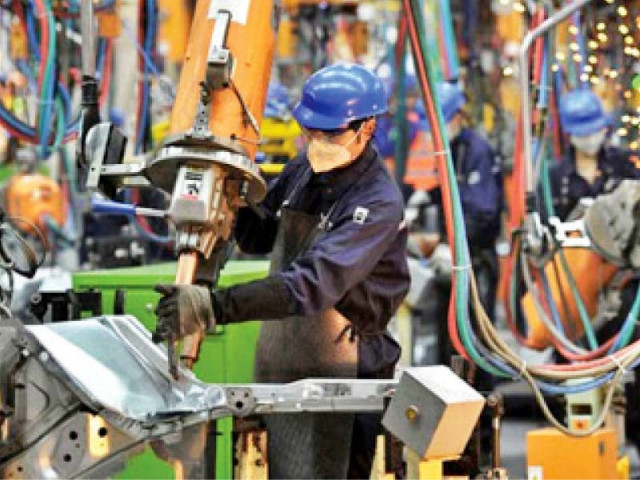LSM grows 11.4% in December
Despite Covid-19 pandemic, industrial output growth accelerates to 22-month high

A majority of large-scale manufacturing (LSM) industries continued to scale up production in December, led by automobile, petroleum product, food and beverages, fertiliser and pharmaceutical sectors.
“The LSMI (large-scale manufacturing index) output increased by 11.40% in December 2020 compared to December 2019,” the Pakistan Bureau of Statistics (PBS) reported on Friday.
With this, the industrial growth accelerated to a 22month high, indicating a much-desired pickup in demand for goods in the middle of Covid-19 pandemic.
The economic activities picked up pace partially in the wake of incentives and industrial and construction packages announced by the government to cushion the impact of Covid-19 on the country’s economy.
Besides, availability of cheaper loans for working capital of businesses played a pivotal role in reviving industrial growth.
The State Bank of Pakistan (SBP) has also maintained the benchmark interest rate unchanged at 7% for the past eight months (since June 2020) with the objective of reviving gross domestic product (GDP) growth to pre-Covid levels or taking it above that in the current fiscal year.
“Industrial sector is now showing a sustained strong growth,” Federal Minister for Planning, Development and Special Initiatives Asad Umar said on his official Twitter handle in the backdrop of latest LSM growth numbers.
Production levels in JulyDecember 2020, as compared to July-December 2019, increased for textile, food, beverages and tobacco, coke and petroleum products, pharmaceuticals, chemicals, nonmetallic mineral products, automobiles, fertilisers and paper and paper board, the PBS reported.
However, the industrial production decreased in electronics, leather product and engineering product sectors.
Cumulatively, in first six months (July-December) of current fiscal year 2020-21, the LSM index increased 8.16% compared to the same period of last year, according to the PBS. On a month-on-month basis, the index surged 13.51% for December compared to the prior month of November 2020.
The automobile industry topped the growth trend in LSM. It grew by a hefty 44% in December compared to contraction of 29% in December 2019.
It was followed by coke and petroleum products, whose output surged 24% in December 2020 compared to a nominal growth of 1.23% in December 2019.
Output of food, beverages and tobacco, and non-metallic mineral products increased by almost 18%. Chemical sector’s production rose 17% and pharmaceutical output grew 14% in December compared to the same month of last year.
On the flip side, output of leather products plunged 41% in December compared to the same month of previous year.
It was followed by the electronics sector, which declined 36%, wood products 30% and engineering products 24%.
“The blow to the industrial sector (from Covid-19) was mitigated by a well-coordinated fiscal and monetary stimulus. The government announced incentive packages focusing primarily on the construction and exportoriented sectors,” the central bank said in its latest report on the State of Pakistan’s Economy for the quarter ended September 30, 2020.
“In addition, the SBP lowered its policy rate from 13.25% to 7%, and initiated several facilitative schemes to speed up the recovery. While the incentives were largely implemented in the preceding period, the positive impact of these measures became more prominent in the first quarter (Jul-Sept) of FY21.”
The growth in automobile manufacturing came with the availability of cheaper car financing as banks opted to offer financing from their surplus liquidity, it was learnt.
“A couple of factors also facilitated growth in petrol and diesel production. Resumption of activities in the transport sector drove public and private sector demand for petroleum products. Stricter border controls also deterred illicit smuggling of diesel to Pakistan which led to increase in demand for products produced locally,” the SBP said in the report.
The growth in food sector was largely driven by the tobacco sector, as the government tried to control illicit trade in the sector. The textile sector continued to grow on the back of revival in exports of the sector.



















COMMENTS
Comments are moderated and generally will be posted if they are on-topic and not abusive.
For more information, please see our Comments FAQ